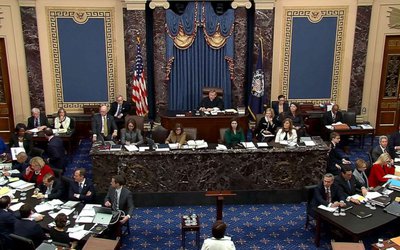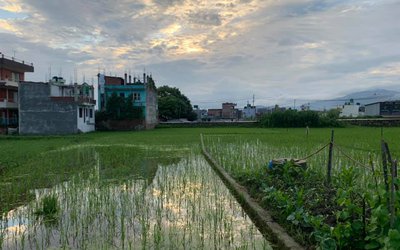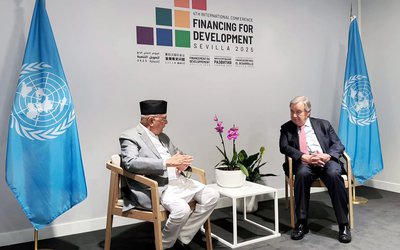
When I was a kid, I was very keen to listen to stories of bravery that my late father used to share in our home gatherings that used to take place almost every week he is at home. I really miss those days of my childhood. In 1974, My father was one of the commanders at the battlefield when the Royal Nepalese Army was mobilized to disarm the Tibetan Khampas, who had been using Nepalese soil as a base to engage in guerrilla warfare against the People's Liberation Army in the Tibetan Autonomous Region of China. The Khampas operated mainly from a base secretly established at Mustang in northwest Nepal. Later brave Nepalese army disarmed the Khampas and those who dared to flee including Khampa commander General Wangdi were killed. This was a testimony in our modern history of Nepal’s unwavering commitment to our foreign policy that Nepal will never let our land to be used against our neighbors. this was the first time the RNA had mobilized domestically in such large numbers (source: Nepal army website).
This is when I started to learn a little bit about the autonomous region of Tibet and China as a country. My father used to tell me a lot of stories about the great leadership of Chairman Mao and the rising of China. The moral of his stories used to be about how important the quality of leadership and hardworking people can be for building a nation.
New China was founded in 1949 and around the same time in 1950, the Rana rulers in Nepal were removed from power, and Nepal was also moved into a democratic system under the monarchy. Nepal and China although not comparable in size but were very poor and backward. After over 70 years today, we are still the poorest country in the world while China has become an emerging superpower.
With my father’s blessings, I was lucky enough to have an opportunity to pursue higher education in China only after 4 years of the start of the reform and open-door policy. I have witnessed the entire history of past 40 years of China’s reform and modernization with my own eyes and this policy indeed jump-started China’s transformation from a poor and underdeveloped centrally-planned economy into an economic powerhouse, increasingly driven by the market.
In this article, I would like to analyze how poor was China when it was founded 73 years ago, what are the
mysteries behind China’s rapid development and what could we possibly learn from China’s success story.
HOW POOR WAS CHINA IN 1949?
Let us look at the statistics, according to data published in the 1981 China Economic Yearbook, in 1949, Chinese population was 541.67 million with a birth rate of 3.6%, a mortality rate of 2%, and an average life expectancy of only 35 years. The comparative metrics below are self-explanatory.


Before the founding of the People's Republic of China, China was one of the poorest and most backward country in the world and many people did not believe it, thinking that it was stronger than African countries. However, in 1949, the per capita power generation of the African country Ghana was 44.5 kWh, which was 5.5 times that of China; the per capita steel production of the African country Zimbabwe was
9.6 kg, which was 32 times that of China; even in India, which is also a populous country, its per capita power generation and per capita steel production were 1.7 times and 12.7 times that of China, respectively. This shows how difficult the situation was when Chairman Mao took over at that time.
THE MYSTERIES BEHIND RAPID DEVELOPMENT IN CHINA
For China, it took only 70 years to rise from a backward agricultural country to the world’s largest industrial country. It took over 100 years for the United States to become industrialized and the world’s largest economy. For Japan, from the Meiji restoration to complete industrialization in the 1960s, it took almost 100 years. China provided over one billion people with free basic education and lifted one-fourth of the world’s population out of poverty in such a short time, what a miracle in human history!
Utterly amazing achievement! but many people do not understand the mysteries behind these miracles. Following are the key differentiators on China’s side that immensely contributed to this grand success.
Dynamic Leadership Dedicated to People
In the 70-year great course of New China, the great leader Mao Zedong led the Chinese people to establish and consolidate New China. As an architect of economic reform and opening up, Deng Xiaoping led the Chinese people to open up the road of socialism, becoming the pioneer of socialism with Chinese characteristics in the new era, loved by people of all ethnicities in China. Under the leadership of President Xi Jinping, Chinese people are determined to write a magnificent chapter in the great rejuvenation of the Chinese nation.
Chinese leaders are well educated, many in technical fields, experienced in various walks of life in China and abroad and morally and ethically dedicated to the people and country. This is the reason that they could navigate the country toward prosperity. They are not obsessed with any rigid political ideology, on the contrary, Chinese leadership believes in continuous improvement of the systems as per the need of the people and time and in return, they enjoy unprecedented faith and trust of the people.
Vision and Mission in the New Era
Chinese leadership skills are usually manifested in first inspiring people to see a beautiful dream and then leading and guiding them towards the ways of realizing them unitedly.
- Chinese dream: In 1979, Deng Xiaoping talked about his Chinese Dream of a moderately prosperous society. By the end of the 20th century, China had attained the goals necessary for the first two steps, to build a strong country and let people live a moderately prosperous life. In 2013, President Xi Jinping re-emphasized the Chinese Dream to achieve the great rejuvenation of the Chinese nation. He reiterated that the Chinese Dream is to build a rich and strong country, achieve the rejuvenation of the people, and let people live happily. He called for people of various ethnic groups to make unremitting efforts to realize this great dream.
- Perseverance for Two centennial goals: Under President Xi Jinping’s leadership, Chinese people must not only build a moderately prosperous society in an all-round way and achieve the first centenary goal but also take advantage of the momentum to start a new journey of building a modern socialist country and march towards the second centenary goal. Up to 2020, it was a decisive period for building a moderately prosperous society in an all-around way. In the first stage, from 2020 to 2035, on the basis of building a moderately prosperous society in an all-around way, China will strive for another fifteen years to basically realize socialist modernization. In the second stage, from 2035 to the middle of this century, China will strive for another fifteen years to build a prosperous, strong, democratic, civilized, harmonious and beautiful socialist modern power.
- Do not forget the original heart and remember the mission: With persistence and hard work everything progresses, no matter how far we go, we should not forget why and where we started and what are the goals of the original departure. Here Mr. Xi stresses the need of remembering the root of the Chinese people while embarking on the historic mission of nation-building.
- Socialist Core Values: People are educated and always reminded of the core values that people should remember as pride in daily life. This is defined by the twenty-four Chinese characters, which literally means striving for prosperity and strength, democracy, civilization, harmony, freedom, equality, justice, rule of law, patriotism, dedication, honesty, and friendliness. It is consistently spread throughout China through public media, the banners are hung in public places, parks, etc. as a reminder of the important strategy of national development.
- Lifting People’s living standard: In the new era Chinese people pay more attention to the quality of life, and the strong demand released by people in the process of improving the quality of life is one of the driving forces of China's economic and social development.
In terms of strategic arrangements, a "three-step" modernization development strategy was put forward by the visionary leaders of China: the first step was to double the gross national product in 10 years from 1980 to 1990 and solve the problem of food and clothing for the people. The second step was to double the gross national product from 1990 to 2000 and reach a level of moderate prosperity in another 10 years. The third step was to use another 50 years or so from the beginning of the 21st century to the middle of the century to bring the per capita gross national product to the level of moderately developed countries and basically achieve modernization.
Shared future for mankind: The idea of building a community with a shared future for mankind is precisely on the basis of inheriting and carrying forward China's traditional culture and wisdom, deepening the world's understanding of China and promoting exchanges and cooperation between various countries and China on the basis of mutual trust and benefits and continuously promote the all-round development and the common prosperity of all the people. China believes in globalization, not unilateralism.
Socialist Governance System for the Betterment of People
China’s social and political structure is different from many other developing and developed countries but in terms of people’s approval rating, it's much higher; people have full faith that “our leadership works for us and our wellbeing and prosperity.” The social governance system with Chinese characteristics of China is deeply rooted in Chinese soil and cultural values are integrated with modern political thoughts which have enormously contributed to the betterment of people’s lives.
The following are the fundamental characteristics of the Chinese governance system that transformed China to a stronger country today:
- The guidance of reform: The development achievements of New China in the past 70-plus years have undoubtedly relied on reform; The realization of the great dream of the new era still needs promotion and comprehensive deepening of reform.
- The pattern of openness: The 70-year history of the development of New China tells us that construction behind closed doors cannot be successful. China will not close the door to opening up to the outside world because of trade protection and trade bullying by individual countries, nor will it slow down the pace of opening up just because some people are worried and afraid; on the contrary, China will be more proactive in opening up to the outside world.
- A stable environment: In the 70 years of New China, no matter how the international situation changes, China has generally maintained national security and stability, social stability and order, and people living and working in peace and contentment, which is a solid foundation for realizing the great cause of national rejuvenation. A particularly important factor here is the domestic environment of stability and unity and the relative stability of the international environment.
- Rule of law and discipline: China is a country with a firm legal system and pursues the basic national policy of strictly governing the country according to law and both the leaders and the people observe the high degree of discipline. It can be seen from the relevant provisions of China's Constitution and laws that the meaning of equality before the law includes three aspects: First, all citizens, regardless of ethnicity, race, sex, occupation, family origin, education level, property status, and period of residence, all enjoy all the rights stipulated in the Constitution and the law on an equal footing, and must also perform the obligations stipulated in the Constitution and the law equally.
- Anti-corruption campaign: Especially, since the 18th National Congress of the Communist Party of China, the Party Central Committee with Xi Jinping as the core has promoted the construction of a clean party and government and the anti-corruption struggle with firm determination, tenacious will and unprecedented strength, promoted the comprehensive and strict management of the party to achieve outstanding results. Since the 19th National Congress of the Communist Party of China, tens of thousands of people across the country have voluntarily surrendered to discipline inspection and supervision organs.
The government has fulfilled the promise that "no matter who they are, no matter how high their position, as long as they violate party discipline and state law, they will be seriously investigated and severely punished, and it is by no means an empty word” and has written a new chapter in the history of mankind's anti-corruption struggle. The overwhelming momentum of the anti-corruption struggle has been formed and consolidated.
- Drive for innovation and progress in science and technology: Innovation is the soul of a nation's progress and an inexhaustible driving force for the country's prosperity. China invested significantly in cultivating a large number of strategic scientific and technological talents, and high-level innovation teams with international standards; and with a high emphasis on research and application of internet and digital technology aim at the forefront of science and technology in the world. The brilliant achievements of New China especially after the reform and opening up are inseparable from the innovation.
Article 1 of the Law of the People's Republic of China on Progress in Science and Technology, states: “ This Law is formulated on the basis of the Constitution in order to comprehensively promote scientific and technological progress, ensure the role of science and technology as the primary productive force, innovation as the first driving force, and talent as the first resource, promote the transformation of scientific and technological achievements into actual productive forces, promote scientific and technological innovation to support and lead economic and social development, and comprehensively build a modern socialist country”.
- People-oriented: Refers to the process of economic and social development, to achieve the goal of all-round human development, the interests of the people as the starting point and foothold of all work, and constantly meet the multi-faceted needs of the people, effectively protect their economic, political, and cultural rights and interests, so that the fruits of development benefit all the people. It is the essence and core of the scientific concept of development.
- Serving the people: refers to "the thought and behavior of working for the interests of the people", which is one of the basic characteristics and norms of communist morality first proposed by Chairman Mao Zedong and is also a legal obligation of CPC members and state organs of the People's Republic of China and their staff.
Quality of People that Transformed China
- Learning ability of people: China's vigorous development is inseparable from the super learning ability of Chinese people, and this kind of training begins from primary and secondary schools, which will not only cultivate students' grand world outlook, develop comprehensively from all aspects of students' morality, intellectual, physical, and aesthetic work, but also teach Chinese to achieve the unity of knowledge and action, not to shrink back in the face of difficulties.
Chinese people’s ability to inherit ancient knowledge and culture and learn advance technology from the developed world is highly commendable in socio-economic development strategies and planning.
- The struggle of the people: Chinese people understand that the realization of a beautiful blueprint cannot be achieved overnight, and it requires continuous struggle and non-stop efforts from generation to generation. As long as the great Chinese people continue to roll up their sleeves and work hard, vigorously carry forward the national spirit and the spirit of the times, the Chinese dream of the great rejuvenation of the Chinese nation will surely be transformed into a beautiful and vivid reality.
- Be united and strong to defeat bullying: Chinese people realize deep in their hearts that one must be strong enough to defeat bullying, and in order to achieve this we must believe in hard work for prosperity. This is also the painful lesson learned by Chinese people from the cruel history of foreign domination. Unity is strength and knowledge is power is the mantra for this and in face of any hardship, we must be optimistic and struggle with a positive mentality.
WHAT CAN NEPAL LEARN FROM CHINA’S SUCCESS STORY?
It is pity that situated between the world’s second-largest economy China and the sixth-largest economy India, and despite numerous efforts to curb poverty, Nepal remains one of the poorest countries in the world. It disturbs so many of us that we have not been able to harness the benefits of the huge opportunities around us. Still, 25% of our population are below the poverty line, and Nepal’s export is minimal and further declining while relying on the import of everything, brain drain and migration of the labor force to foreign countries is so severe that Nepal does not even have enough workforce for domestic consumption. This shows how dire the situation is.
Having studied and lived in China for decades and closely witnessing the Chinese development efforts from the early eighties to date, I have a few observations about learnings that could be helpful in our development efforts in Nepal.
It’s obvious from a high-level perspective that the primary reasons behind the current backward state of Nepal are political instability, corrupt politicos and bureaucrats, poverty inducing poverty – the vicious cycle, lack of employment opportunities, lack of environment for industries and investment law, outdated agriculture, migration of youth to foreign markets, lack of good infrastructure, lack of proper tourism development, lack of investment in education and health, lack of proper planning of land, lack of consistent foreign policy and balanced relationship with the giant neighbors, lack of unity between people and lack of a sense of nation building sentiment in political parties and people and the overall bad governance, the list can go on and on.
There is no doubt that it takes years of hard work to change the current situation in Nepal if correct policies and strategies are developed by Nepalese people and parties, suitable for Nepalese soil and rigorously implemented. There is no universal political system and development model that we can import or replicate from other countries including China. Nepal is a multi-party democracy and should remain with Nepalese Characteristics. Nepal must have its approach to development and the first thing we possibly could do is unite the fragmented Nepalese people. There should be an all-party consensus on this matter and a national conference on this matter without the influence of foreign power centers could be a way forward.
As much as what we can learn from China’s experience, my observation is that we should learn things that is easily applicable in our specific contexts but not forget our roots and precious culture and civilization.
- Ensure rule of law, no impunity to corrupts no matter who, starting from the top to bottom in all sectors, make anti-graft body and judiciary independent and strong
- Sweeping reform, mainly in the education sector, trains more technical resources, makes people aware of duties and responsibilities in every field, enhances the sense of identity and nation building
- Women’s rights and dignity - There should be no discrimination against women and the state must protect the legitimate rights and interests of women
- Utilize technical expertise in making short-term and long-term plans, ensure continuity in vital development policies and constantly track the progress and recovery plan as needed
- Invest in infrastructures as they are the foundation for development, mainly road and air transportation, green energy, etc. start a study on railways at least to connect north-south and east-west, open more accesses at the northern border
- Practice national interest-based foreign policy and balanced friendly relationships with the neighbors
- Poverty alleviation, we need a meaningful poverty alleviation strategy, key is the modernized agriculture sector, stop the mismanagement of land, and implement scientific land reform and management system
- Attract domestic and foreign investments, do not just rely on foreign aid and remittance money, and encourage domestic production and exports for self-reliance
- Enhance tourism and light industrial sectors suitable for our country
- Stop the misuse of democracy by politicians, and stop nepotism, politics should not be taken as a profit business, instead, it should be for the service of people.
We need both systemic reform and behavioral change through a nationwide campaign. On the one hand, we need to create a conducive foreign investment climate, formulate investment laws, create efficient bureaucracy and in the other encourage the private sector to implement more and more poverty reduction projects. For defeating poverty, apart from the pro-people agenda and sincerity of the leadership, sufficient resources are also indispensable.
Chinese economy did not transform overnight and achieved the highest numbers of billionaires and poverty-free society today. If we look at what we see in daily life in China that people are very conscious of time, work, duty as well as responsibility and they know if they breach the law, then they have to face the consequences without question. At the workplace, they have to abide by the workplace rules and regulations, work ethics and code of conduct. Work is a culture in China and the performance measurement system is rigorously enforced everywhere. In return, they enjoy their salary package, benefits, social insurance, bonus, etc. after necessary tax deductions. This is so systematically done throughout China.
Freedom and democracy in China by no means is - you can do whatever you like regardless of others, freedom also means respecting others’ freedom while you exercise yours. Chinese people are very pragmatic, freedom and democracy do not mean activities like strikes and Nepal bandh or disruption of public law and order, destruction of public or other’s properties, or acts of profanity like in Nepal. For Chinese people, freedom means basically a shelter to live, food on the table, decent quality sanitation, access to affordable health, transport and education, a safe and secure living environment and showing respect to others. Chinese people feel that they not just represent an individual, but represent society and the Chinese nation as a whole so wherever they go and whatever they do they do show cultured behavior and pay attention to the image of China, and this is something we should learn while we exercise freedom and democracy back home.
Nothing is impossible in face of determination, dedication and discipline and China has proved it repeatedly, be it the gigantic task of poverty alleviation or so many technological achievements. Take the recent fight against Covid as an example, because of strong leadership that China has always adhered to the supremacy of the people and their lives, and with unparalleled courage and tenacity, China has been able to control the epidemic at the earliest, adhere to the dynamic clearance, and achieve remarkable results.
Although it was only in the early years of China’s reform and open policy when my father was never tired of telling stories of Chinese glories and that we could learn a lesson from China if we wanted to prosper. How happy would he be if he were still alive and could see his dream country China transformed to be a prosperous country so soon? If he were here today, I am sure with full of army spirit he would encourage us to fight against two cancers in our society - corruption and poverty.
Silwal is an engineering project management professional with a structural engineering background, and over 30 years of work experience in international infrastructural, resources and energy projects in various capacities. He is currently, working as a senior project management professional at Siemens Healthineers based in Shanghai.













